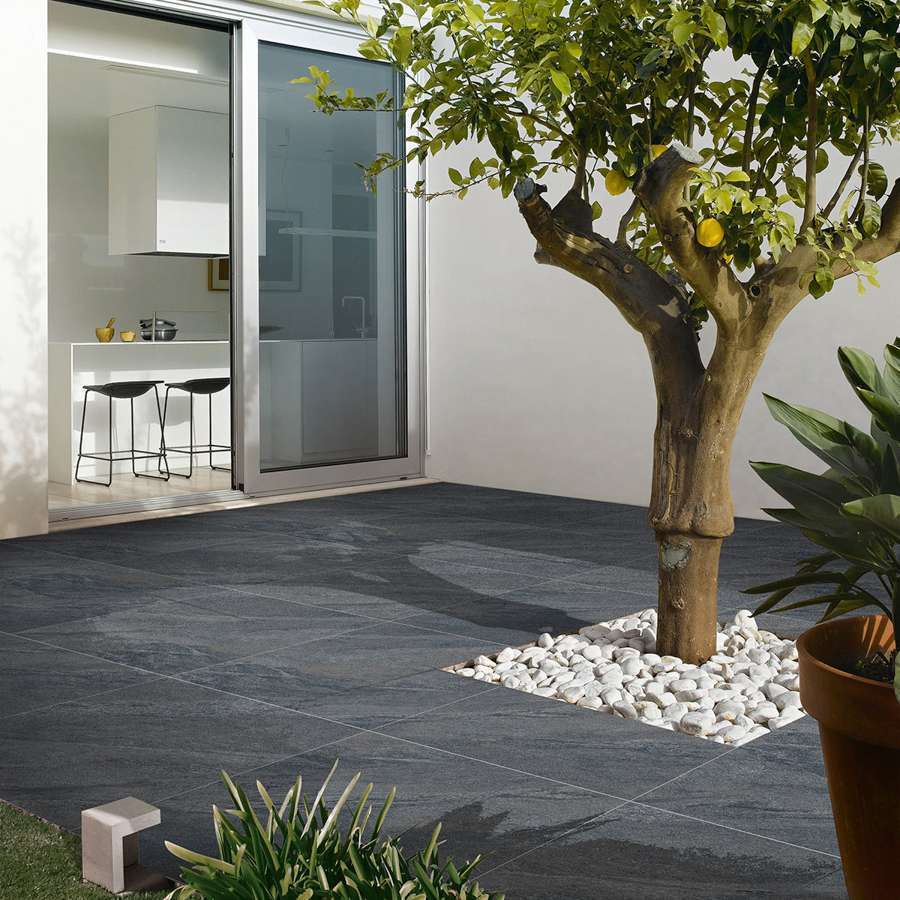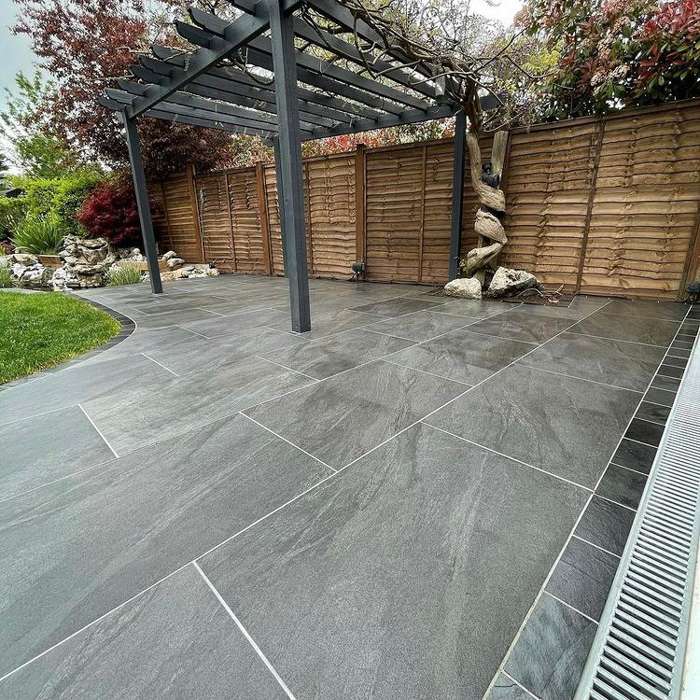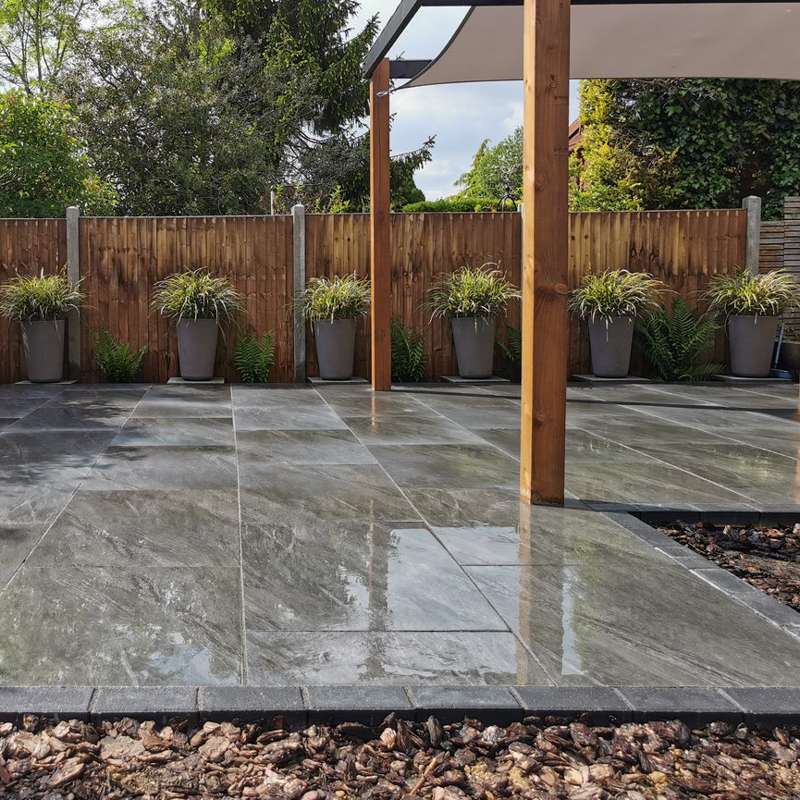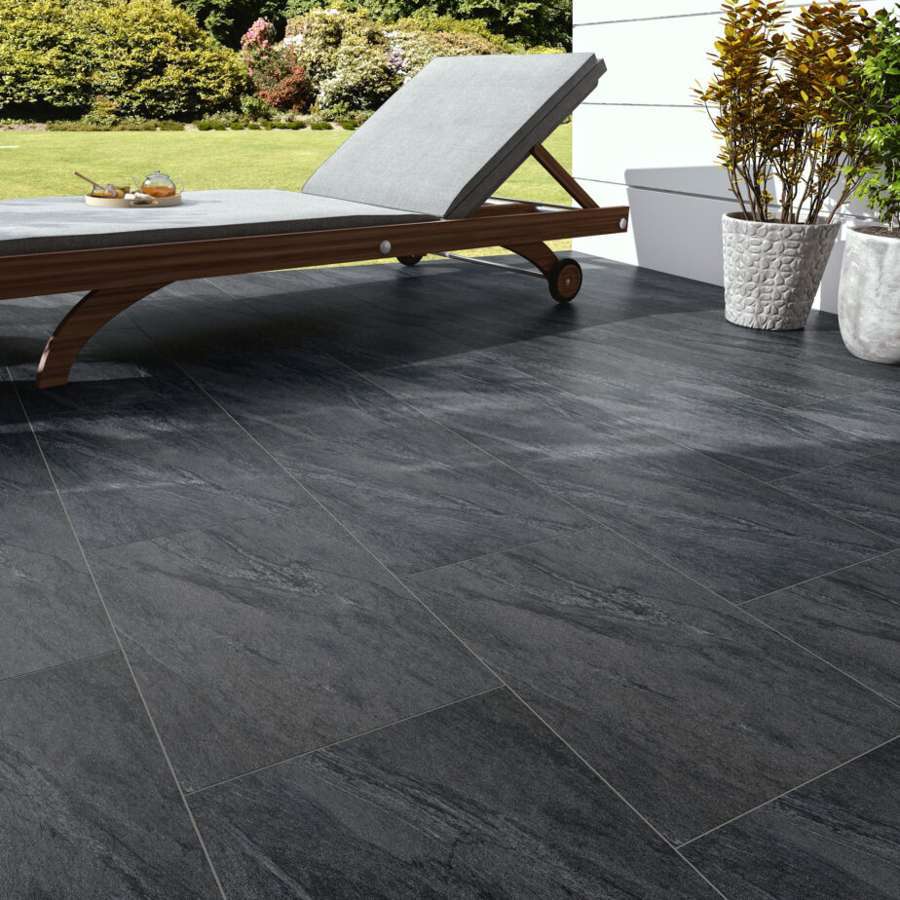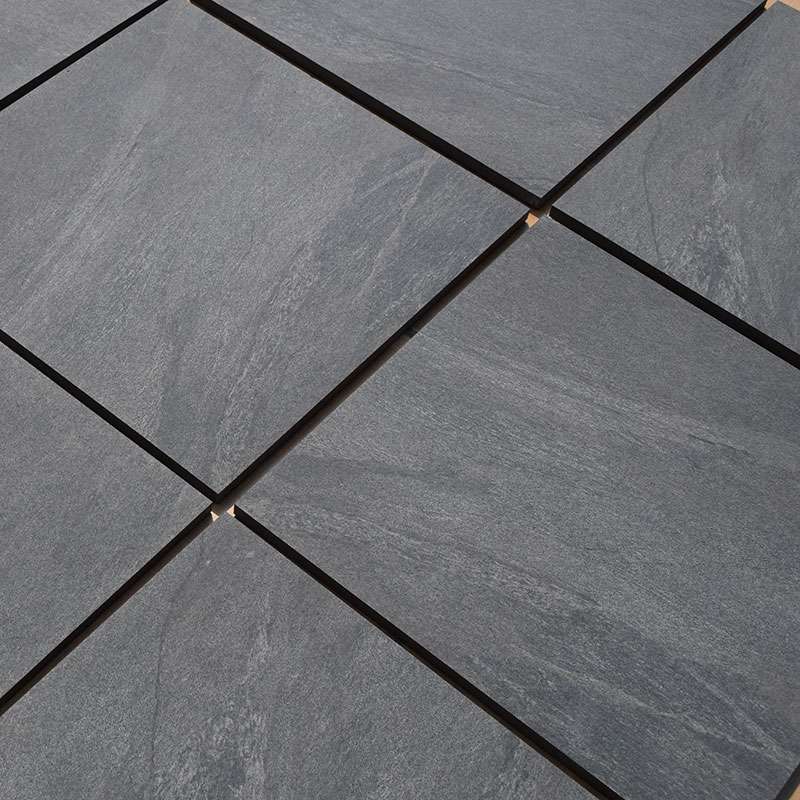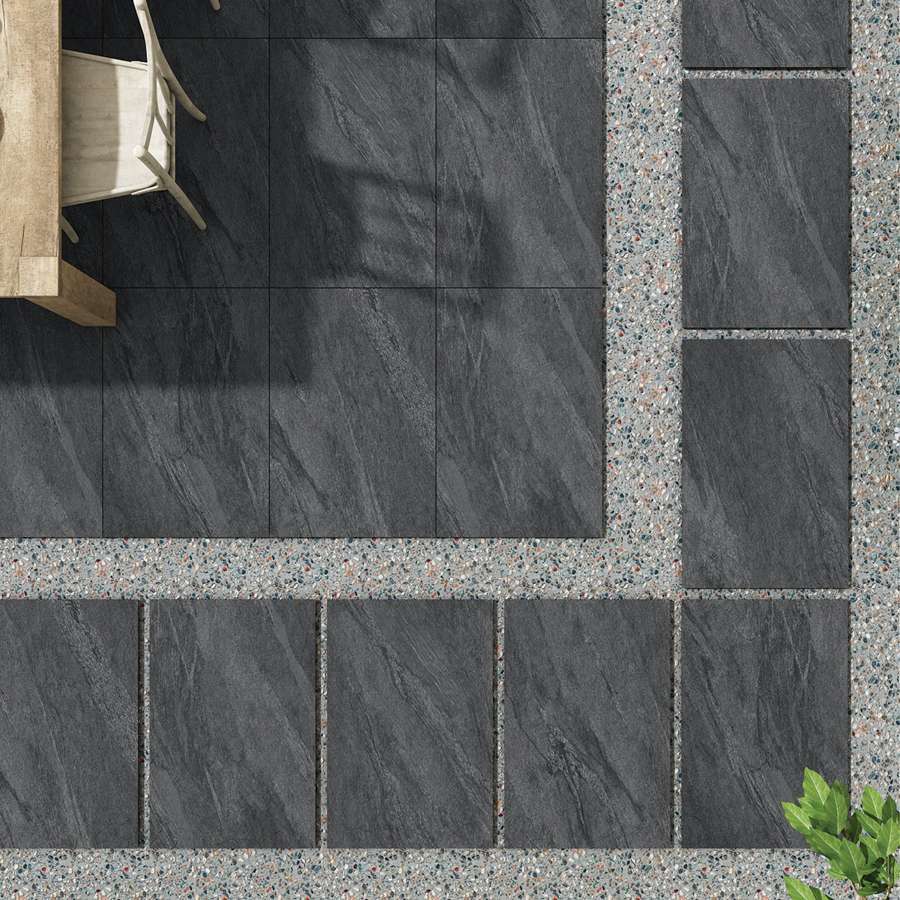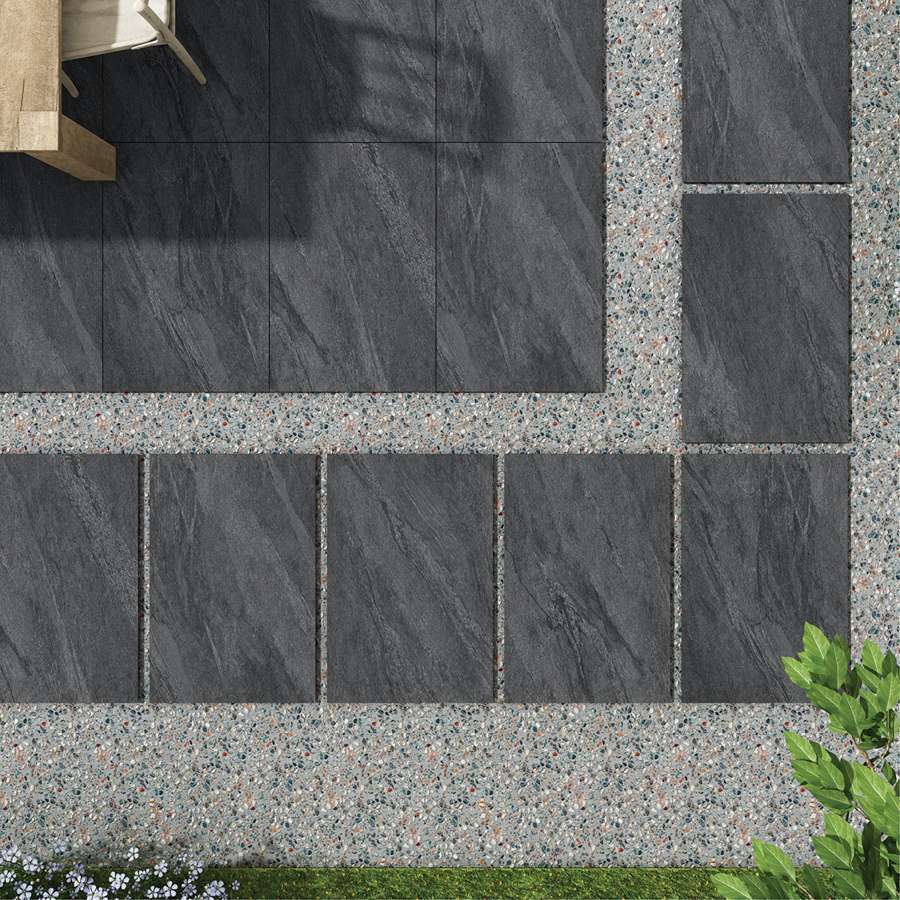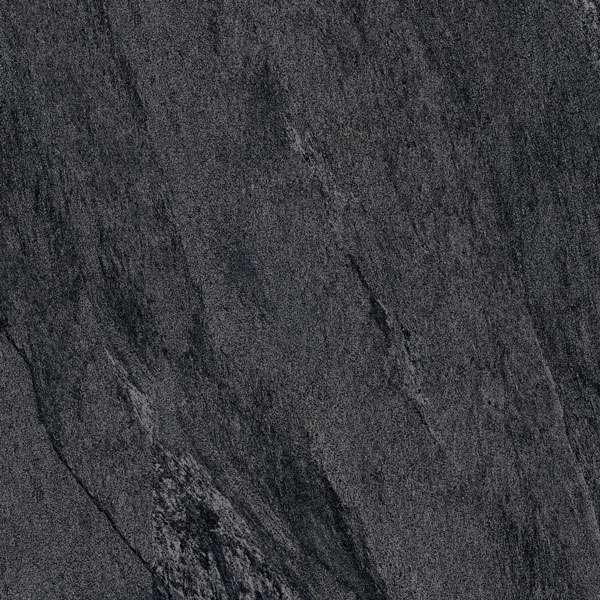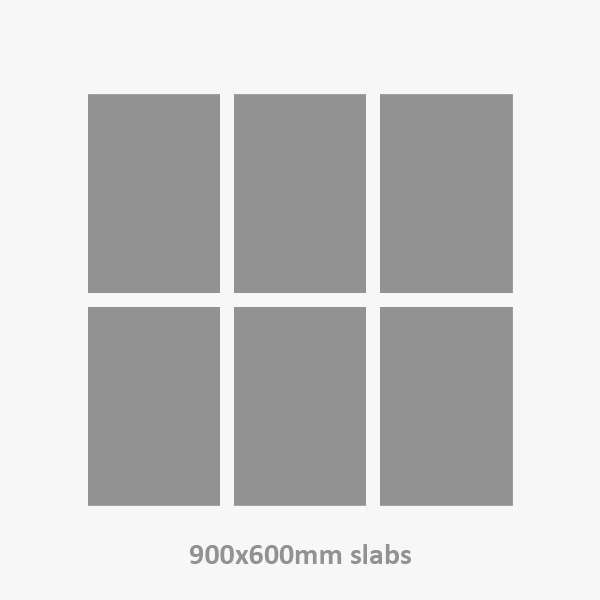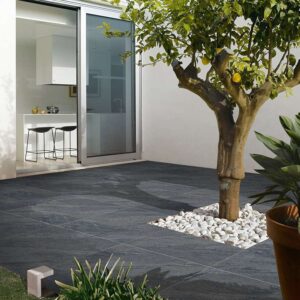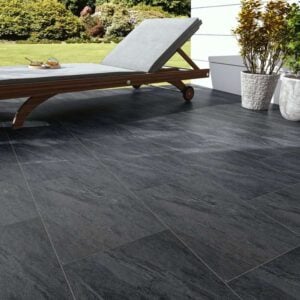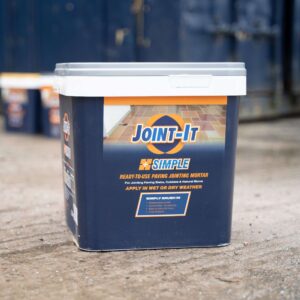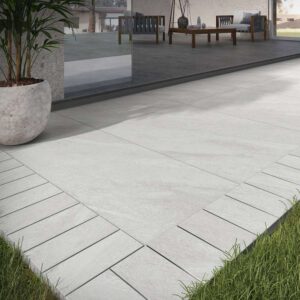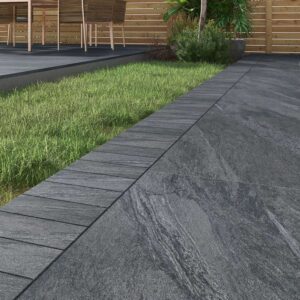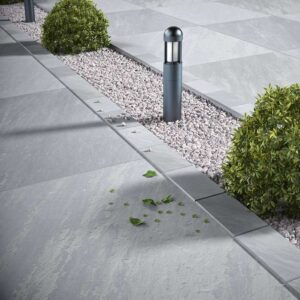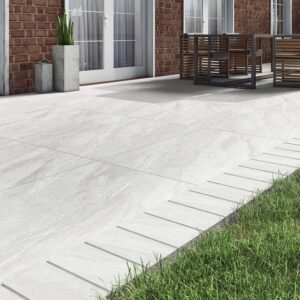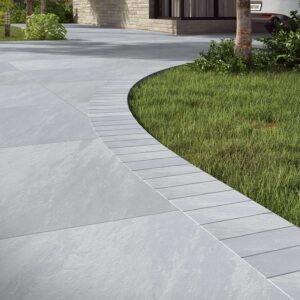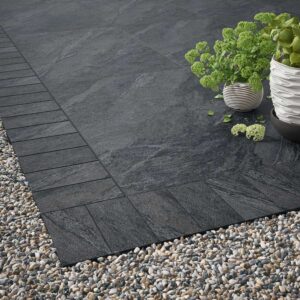Anthracite Black Outdoor Porcelain Paving Tiles – 900x600mm – 16mm
From £21.13/m²
£619.00 inc. VAT
- Hard-Wearing & Highly Durable
- Stone Effect Textured Surface
- Looks Great Wet & Dry
- Low Maintenance
- R11 Non-Slip Rating
- Stain, Scratch & Shock Resistant
Pack Coverage:

FREE Delivery UK-wide*
Free shipping on all orders

Kerbside Pallet Delivery
Delivered via Palletways
Trade & Bulk Discounts
Up to £40 off per pack on all paving

Price Match Guarantee
We will not be beaten on price
Black porcelain slabs are high-quality paving tiles that offer a luxurious and modern look to your outdoor space, whilst also offering durability and slip resistance.
Product Info
| Brand | Ammaari Stones © |
| Product | Paving Slabs |
| Material | Porcelain (Vitrified) |
| Thickness | 16mm |
| Surface | Stone Effect, Textured |
| Edges | Square |
| Colour | Anthracite Black |
| Origin | India |
| Suitable For | Patios, Paths, Steps |
| Sealing | Not Required – Vitrified Porcelain |
| Frost Resistant | Yes |
| Slip Resistant | Yes |
| Scratch & Shock Resistant | Yes |
Pack Sizes
| Slab Size | 29.3m² |
| 900x600mm | 52 slabs |
Care Instructions
We recommend brushing away any dirt/debris from your paving slabs on a regular basis and washing the surface of the slabs when required. A regular spot clean with a seasonal power wash will keep your porcelain slabs looking brand new year-round.
We advise you to use warm soapy water with a stiff brush to scrub the surface of the paving. Do not use any acidic or acidic-based solutions when cleaning your porcelain paving slabs.
We're here to help
Frequently bought together...
You may also like...
Product Information
Black porcelain slabs are high-quality paving tiles that offer a luxurious and modern look to your outdoor space, whilst also offering durability and slip resistance.
Product Info
| Brand | Ammaari Stones © |
| Product | Paving Slabs |
| Material | Porcelain (Vitrified) |
| Thickness | 16mm |
| Surface | Stone Effect, Textured |
| Edges | Square |
| Colour | Anthracite Black |
| Origin | India |
| Suitable For | Patios, Paths, Steps |
| Sealing | Not Required – Vitrified Porcelain |
| Frost Resistant | Yes |
| Slip Resistant | Yes |
| Scratch & Shock Resistant | Yes |
Pack Sizes
| Slab Size | 29.3m² |
| 900x600mm | 52 slabs |
Care Instructions
We recommend brushing away any dirt/debris from your paving slabs on a regular basis and washing the surface of the slabs when required. A regular spot clean with a seasonal power wash will keep your porcelain slabs looking brand new year-round.
We advise you to use warm soapy water with a stiff brush to scrub the surface of the paving. Do not use any acidic or acidic-based solutions when cleaning your porcelain paving slabs.
Black porcelain outdoor paving specifications
Not only do our black porcelain patio slabs look stunning and make the perfect addition to modern, contemporary gardens, they are also extremely hard wearing with a low water absorption rate. Black porcelain outdoor slabs are made from the highest quality materials to ensure they have a long span for your outdoor area, meaning you can enjoy them for years to come.
Using pure kaolin clays and blended with natural minerals, the black porcelain paving tiles are then fired at 1200 degrees Celsius to make them harder than natural stone. It also means that our black porcelain paving slabs have an extremely low water absorption rate, so they are resistant to moss, algae, mould, and frost. They all have a slip rating of R11 – so you can enjoy your black porcelain patio slabs no matter what the weather!
We have a wide range of black porcelain paving slab 900×600, so you can add a touch of style to your garden without having to worry about cost or hassle. Create the garden of your dreams today.
Enhance Your Space with Anthracite Porcelain Paving
You deserve an eye-catching patio, pathways, gardens, and other outdoor spaces. These top-grade paving slabs are available in different designs and patterns. So, you’re sure of finding something that works for you. The products are specially designed to support significant loads while still maintaining their perfect shapes, designs, colours, and patterns – you can count on their strength and sturdiness to handle heavy foot traffic.
Why Is Anthracite Porcelain Paving Popular?
People want paving materials that can stay strong and in perfect shape for a long time. With these slabs, you can have a strong patio. It’s because they’re backed under high temperatures which makes the compact. They can withstand scratches and abrasions while still being excellent – they’re among the most durable paving slabs you’ll ever encounter.
Anthracite porcelain paving offers a low-maintenance option. First, you don’t need to seal these slabs. They’re fade-resistant which means they maintain their attractive colours even when exposed to an area with direct sunlight and heat for a long time. Besides, they are easy to clean – warm soapy water is enough to remove any dirt on these slabs.
For that excellent outdoor look, install black porcelain paving slabs 900×600. They’re less porous, algae/moss/frost resistant, and provide a firm and comfortable underfoot grip. You can never go wrong with these great paving slabs.
Why choose our black porcelain slabs?
Our black slate paving has been designed to mimic the traditional look of natural stone and will add a striking and contemporary tone to your outdoor landscape. Other reasons to choose black porcelain garden slabs include:
- Low maintenance – thanks to the low water absorption rate, there is no special method used to clean the black porcelain paving you choose; all you need to do is wash with water once or twice a year.
- Robust and durable – thanks to the high firing temperatures, your black porcelain paving slabs 900×600 can withstand all weather conditions and will be difficult to crack or chip once they have been laid.
- Anti-slip – black porcelain slabs have amazing anti-slip properties, making them perfect for the Great British weather!
- Anti-frost – you don’t have to worry about your black porcelain outdoor paving freezing and cracking over the winter thanks to the anti-frost technology.
- Anti-fade – as the natural stone effect is printed onto the tiles, you don’t have to worry about them fading over time due to exposure to the sun.
- Moss and algae resistant – the low water absorption rate means you don’t have to worry about moss and mould forming on your tiles and ruining them.
How do you clean outdoor porcelain paving?
Our porcelain paving slabs are stain resistant as well as being strong and durable, and they require little to no effort to maintain and clean. You do not need any special products, and they do not require special attention to keep them looking brand new.
We recommend using a power washer or mixing a PH neutral detergent with water with a brush once a year to keep your black porcelain outdoor slabs looking the same as the day that you bought them.
What is the difference between porcelain, vitrified and sandstone?
Both porcelain and vitrified paving both go through the vitrification process making them strong, hard wearing and with low porosity, however the newly developed vitrified paving is slightly stronger than traditional porcelain paving.
Vitrified tiles are made using a combination of clay, feldspar, silica, and quartz which is hydraulically pressed together and then fired at temperature between 1200 and 1550 degrees Celsius. The vitrification process occurs when the heat is between these two temperatures, and the finished product produces an extremely strong glass type quality. Porcelain tiles go through the same vitrification process; however, these tiles are not hydraulically pressed before they are fired. It is this pressing, the new combination of ingredients and higher baking temperatures which have enabled the new production of vitrified tiles to become even stronger and more durable than traditional porcelain tiles.
Sandstone on the other hand is a naturally formed stone that is found in India, and the tiles are usually cut down from much larger stones. This means that sandstone tiles do not go through the same manufacturing process as porcelain and vitrified tiles, and sandstone tiles are slightly more brittle and a lot more porous. Sandstone paving tiles will naturally fade over time due to exposure to direct sunlight, whereas porcelain tiles will keep the same colour and patterns.
Natural variation information
Our black porcelain paving slabs have a printed design and will not fade when exposed to direct sunlight thanks to the high firing temperatures used in the manufacturing process.
Installation and Aftercare
With the right materials and preparation, installing outdoor porcelain tiles can be an easy task. Installing your own outdoor area can be extremely rewarding, but make sure that you handle your tiles with care to avoid breakages.
You will firstly need to mark out the area that you wish to pave and remember to add additional tiles for breakages and waste cut offs. You will then need to prepare the ground and dig a base around 15-20mm deep. Your base should be even and solid and you may need an additional layer of sand or fine gravel to help the tiles bond more securely.
Once the base is ready, you will need to add a layer of mortar onto the compressed soil or sand. The tiles will need priming before you begin to lay, and once these have been primes with a priming slurry you are ready to lay your patio! Once all the tiles have been laid, you will need to use an exterior grout to ensure that your tiles are secure and safe.
If you wish to clean your new patio, simply sweep away the debris and wash with water. You can either simply power wash the patio or use a PH neutral detergent and water so you don’t bleach the tiles.
FAQs
Is porcelain good for paving?
Porcelain is extremely good for patio paving, not only is it durable, low maintenance and aesthetically beautiful, but you can also get fantastic offers that are more cost-effective than using natural stone. Porcelain paving also offers stain resistance, slip resistance and frost resistance – so you know that your patio will withstand all weather conditions.
How long does porcelain paving last?
One of the main benefits to using porcelain paving is its good longevity. Providing you choose high quality porcelain tiles and have them laid properly with a good bedding, your porcelain paving can last you many decades (up to 50 years).
Can you power wash porcelain tiles?
As porcelain tiles are durable, hard wearing and stain resistant, power washing is the recommended form of cleaning. You will not need to give porcelain tiles any special attention, and you will not need any special cleaning products. All you need to do is power wash your tiles once or twice a year to keep them looking brand new.
Is porcelain paving slippery when wet?
Unlike natural stone, porcelain tiles are non-porous, and they do not attract algae, moss, or mould. While they are extremely slip resistant, porcelain paving can still get slippery when it is wet or icy, as any outdoor surface can. During harsh weather conditions, you will still need to be careful when walking on porcelain paving.
Can I use porcelain tiles outside?
In short, yes – porcelain tiles are perfect to use outdoors and are extremely suited to the British weather conditions. Due to the manufacturing process, porcelain paving tiles are strong and hard wearing, and compared to natural stone or concrete slabs, porcelain requires very little cleaning to maintain
What do you put under porcelain tiles outside?
You will need to lay your porcelain tiles onto a fresh bed of mortar to ensure that the tiles are secure and will not come loose. You will also need to make sure that you have prepared the ground underneath the mortar correctly, as porcelain tiles require a stronger bond than natural stone to keep them in place.
Can porcelain be laid directly onto concrete?
Yes, in most cases you will be okay to lay your porcelain tiles directly onto concrete instead of soil or another base. You will need to ensure that the concrete surface is free from any dust, moisture, and debris as these can prevent the tiles from bonding. You will also need to ensure that the concrete is in good condition before you begin to lay your porcelain tiles.
Do you need to grout outdoor porcelain tiles?
In order for your tiles to stay in place, and for the ground underneath to stay in good condition to prevent cracking or slipping, you will need to grout your outdoor porcelain tiles. You will need an exterior paving grout to ensure that your new outdoor space will withstand all weather conditions and keep your tiles safe and secure.
How do you prepare a floor for porcelain tiles?
If you have a solid and flat base, then you can simply use the mortar to lay the tiles. If you have soft or uneven ground then you will need to create a stable surface using a layer of sharp sand or fine gravel. Porcelain tiles need a strong bond to keep them in place so it is important that you prepare the base correctly.
Do porcelain paving slabs stain?
Due to their strong glazed surface, porcelain tiles are extremely stain resistant and have a low water absorption rate. These characteristics mean that staining is rare, and the only cleaning that they require is washing with water or a diluted neutral detergent. Some stubborn marks may need a bit of elbow grease to get rid of them, but they will look brand new in no time.
How much does porcelain paving cost?
Porcelain paving slabs in general are cheaper than natural stone, but slightly more expensive than concrete flags. The cost has come down over the years for porcelain paving tiles, and the number of benefits you have over choosing porcelain greatly outnumber saving a little bit if you opt for concrete flags.
What is ‘vitrified’ porcelain paving?
Vitrified porcelain paving refers to the type of paving tile that is made from pure kaolin clay mixed with minerals, including quartz and feldspar. It is then fired at 1200 degrees Celsius, making vitrified porcelain tiles very hard and extremely durable. The high firing temperatures also ensure that vitrified porcelain tiles have a low water absorption rate.
What is the best way to lay porcelain paving slabs?
You will need to ensure that the ground is solid and even before you lay your porcelain slabs, and this may mean using sand or fine gravel before you start. You will need the correct mortar mixture and you will need to prime your tiles before you begin to lay them. Finish them off with exterior grouting to ensure your tiles are securely in place.
Can you have a porcelain driveway?
As porcelain tiles are hardwearing, durable and slip resistant, they are the perfect option if you are looking for an attractive alternative to natural stone driveways. You can purchase porcelain tiles in thicknesses up to 30mm, and their additional strength means they will offer an ideal laying solution to your driveway.
How do you cut porcelain paving slabs?
If you are looking to cut porcelain paving slabs, then the only effective way is to use a diamond wet blade saw. You will not be able to use hand tools or basic blades to cut through porcelain tiles due to their strong and hard wearing properties, even if they are marked as suitable for cutting through hard materials.
What’s special about these tiles?
Porcelain tiles are denser than ceramic tiles, and they are a non-porous material. This combination means that they are extremely hard wearing, durable, and slip resistant as they repel moss and algae. These strong properties make porcelain tiles perfect for outdoor areas that will see a lot of heavy footfalls, while still looking stunning.
Should I select a smooth or textured surface?
There are pros and cons to both smooth and textured porcelain tiles – smooth tiles are easier to clean whilst textured tiles over more traction. If you are looking to use porcelain tiles outdoors, for example on a patio or driveway, generally people will use textured tiles so that they have more slip resistance when it is raining or snowing.
What laying pattern should I choose?
There are 4 main laying patterns that you can choose from when laying your outside tiles. A random laying pattern will give a more rustic feel, a stack bond paving laying pattern is very uniform and looks like a chessboard, a stretcher bond laying pattern is one of the more simpler laying patterns and is also known and the running bond, and finally the herringbone laying pattern is the traditional laying pattern for single, rectangular tiles.
Is porcelain better than sandstone?
Your outdoor space paving is purely down to personal preference, but both porcelain and sandstone have pros and cons. Porcelain is durable, hardwearing and will not fade in the sun, but the installation can be tricky. Sandstone is long lasting, eco-friendly and easy to maintain, however they have a high water absorption rate and can get scratched easily.
Is it safe to clean my tiles with household bleach?
While using a household bleach diluted with water will not affect the properties of your tiles and cause them to break or crack, the acid in the bleach may alter the colour of your tiles or stain the grout. Instead, use a diluted PH neutral cleaner or a pressure washer to clean your outdoor porcelain tiles.
Is porcelain porous?
Porcelain tiles are made from clay and other natural materials. These are blended together and fired at extremely high temperatures, making them well known for being highly uniform and non-porous. This means that they have a low water absorption rate and will repel moss, algae, and mould.
How thick are porcelain paving slabs?
The standard thickness of outdoor porcelain paving slabs is usually 2cm (20mm) thick, and this is usually sufficient if you are looking to pave patios, terraces, and pathways. You can get porcelain paving slabs up to 30mm thick, and you should consider using these thicker porcelain paving slabs if you are looking to pave your driveway.
Does porcelain paving fade?
Unlike other natural stone paving, porcelain paving tiles do not fade or change when they are exposed to direct sunlight over a long period of time.
Block "custom-product-upsell" not found


